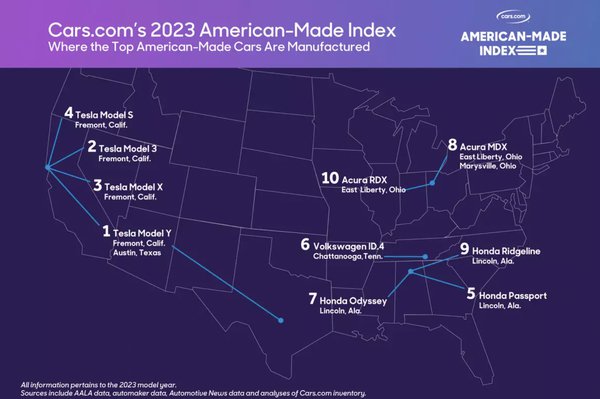
On the eve of Independence Day, it
seems like an appropriate time to visit the question of what is and isn’t “American” when it comes to automobiles.
Cars.com recently revealed its annual examination of the most “American”
vehicles.
The company’s criteria for the index, which dates back to 2006, includes: location of final assembly, percentage of U.S. and Canadian parts, country of origin
for available engines, country of origin for available transmissions and U.S. manufacturing employees relative to the automaker's footprint.
“Many Americans consider
where the products they buy are made in hopes their purchase will contribute to the U.S. economy,” according to Cars.com. “While that might seem easy enough with a T-shirt, few items get
as complicated as the set of wheels in your driveway.”
advertisement
advertisement
Austin, Texas-based Tesla leads the list this year capturing the top four spots with its Model Y, Model 3, Model X and
Model S.
Finishing out the top 10 are Honda Passport, Volkswagen ID.4, Honda Odyssey, Acura MDX, Honda Ridgeline, and Acura RDX.
Honda led all automakers with five
Honda/Acura models in the top 10 and nine models ranking among the top 15 on the Cars.com 2023 American-Made Index.
Based on its longstanding commitment to build products in America, Honda has
consistently been a leader in the number of vehicles making the top of the list.
This is the first time the Detroit Three — General Motors, Ford and Stellantis — did not
have an entry in the top five spots.
Last year, the Lincoln Corsair was in third place (it dropped to 16th place this year) and in 2021 the Ford Mustang was in second, while
Jeep Cherokee was in fourth and Chevrolet Corvette was in fifth place.
So the question becomes: How much do consumers really care about how “American” their vehicle
is?
In some cases, ignorance is bliss. A fellow reporter noted during the media press conference with Cars.com that in Detroit in particular, there is a whole generation of
consumers — largely baby boomers and some Gen X — that are entrenched in the belief that buying a vehicle from a U.S.-based company like General Motors even if it’s built in a
foreign country is more “American” than a Honda or Volkswagen that is built in the United States.
As I was pondering the factor of patriotism into loyalty, I began to
wonder how much cost plays into it. In Detroit, for example, many consumers are able to take advantage of “friends and family” discounts related to the Detroit Three. Vehicles from those
companies still dominate the roads in and around Detroit.
I test drove a Buick Envista last week and while I can’t reveal my driving impressions until July 11, I can
tell you that it was built in South Korea. That could figure into the remarkably low starting price of $23,495. Will anyone who is looking for an affordable car with a lot of standard safety features
care that it’s not built in the U.S.? Doubtful.
I conducted an informal survey on social media last week asking friends and family how much they care about
discounts and whether they care about where a car is made or if it’s considered “American.”
Several of the Detroit-area respondents explained their loyalty to the
Detroit Three. “They pay my pension, I drive their vehicles,” says one. “Loyal Ford owner. Three generations of Ford workers,” says another.
“My
Dad and multiple other family members all worked for the same manufacturer, and I wouldn’t buy anything else,” says a commenter. “I did get to use the plan once, but that’s not
a factor for me. I grew up loving the cars my dad helped build, and I don’t think you can turn that off.”
One of my friends “wins” for covering all the
bases.
“We currently own one GM vehicle, one Chrysler/Jeep vehicle, and two Ford vehicles,” she writes. “Between me, my husband, and my siblings we can
receive discounts at any of the Big Three. Our main requirements when choosing a vehicle are cost, safety ratings, vehicle size, fuel economy and our purpose/use for the vehicle. We don't have any
particular brand loyalty, although we do stay within the three major U.S. manufacturers when looking for vehicles — probably due to my dad having been a life-long Ford employee and supporter of
U.S. car companies.”
I’m in a similar situation and am pondering my next vehicle. If my father were still alive, he would no doubt be urging me to take advantage of my
GM family discount, which I continue to get for life thanks to the GM Family Legacy Program.
But my own loyalty has been skewed by all I know about the automakers
(including GM) as well as my experience driving dozens of new vehicles every year, not to mention what happened to me in my last vehicle.
My most recent General Motors SUV,
which I loved dearly, had a fatal engine malfunction, leaving me stranded on the side of the interstate for two hours in sub-freezing weather this past winter. I came to find out that engine has been
the subject of multiple class-action lawsuits nationwide.
So where does that leave me and what should I buy? Loyalty is a complex issue.